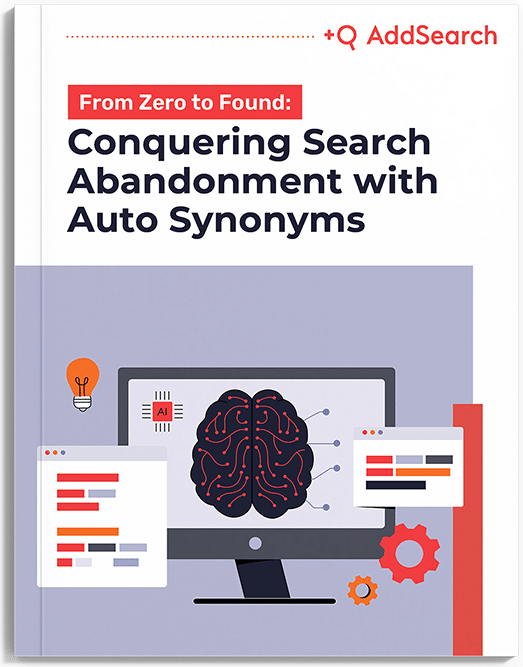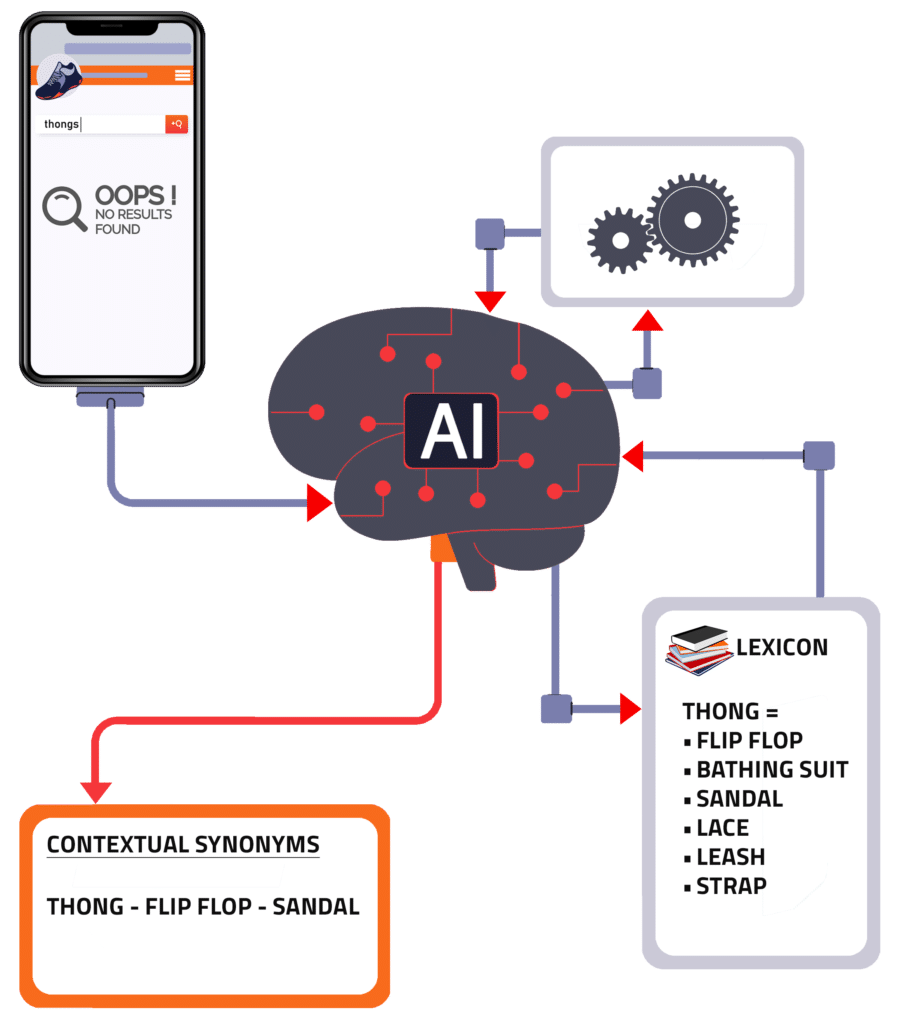The evolution of search language
As the digital marketplace continues to grow globally, so does the complexity and diversity of online search queries. With over 5.3 billion internet users worldwide, the variety of search terms used reflects a rich mosaic of global cultures and languages. This linguistic diversity, while demonstrating the extensive reach of e-commerce, also introduces unique challenges for online retailers.
Today’s online searches have become increasingly conversational and specific, mirroring the natural language patterns of users from different parts of the world. For example, what is known as ‘sneakers’ in the United States might be searched for as ‘trainers’ in the UK or ‘runners’ in Australia. A ‘jumper’ in the UK refers to what Americans call a ‘sweater.’ This variation in nomenclature, along with the growing expectation for tailored shopping experiences, makes matching search queries with the appropriate products more complex.

Insights from Chain Store Age highlight this evolving scenario: three in 10 users spend at least three minutes on retail websites trying to locate items, indicating a gap in search efficiency. This situation underscores the importance of understanding and adapting to the nuances of global and regional language variations in online searches.
Moreover, with a significant portion of shoppers expressing a desire for search results that align more closely with their queries, it’s evident that embracing these linguistic nuances is key. The rise of AI-driven technologies like ChatGPT further illustrates the market’s inclination towards more sophisticated, language-aware solutions in the e-commerce domain.
Research done by Rishiraj Saha Roy, a senior researcher at Max Planck Institute, supports these observations, highlighting the evolving nature of search queries. As users become more sophisticated in their online interactions, their search terms also become more structured and segmented, reflecting specific needs and preferences. This evolution underscores the importance of e-commerce platforms adapting their search functionalities to these changing patterns.
As businesses strive to adapt to these linguistic nuances, they encounter a significant hurdle: the effective use of synonyms in their online platforms. This challenge brings us to the next crucial aspect of modern e-commerce – managing synonym usage to align with the diverse and evolving language of global consumers.

Losing customers to no hit searches? Auto Synonyms helps turn every missed search into a successful find. Learn how in our latest white paper.

Challenges in synonym usage in e-commerce
While the strategic use of synonyms can significantly enhance the user experience in e-commerce, it’s not without its challenges. The primary difficulty lies in ensuring that synonyms are applied effectively and accurately, avoiding confusion in search results that could detract from the user experience and potentially drive customers away.
One of the key challenges is the sheer diversity of language. The same product can have different names in different regions, not just globally but also within the same language due to regional colloquialisms and slang. For example, terms like ‘sofa,’ ‘couch,’ and ‘settee’ might all refer to the same piece of furniture, but their usage can vary widely based on regional preferences.
The research paper “Are Web search queries an evolving protolanguage?” sheds light on the challenges of language diversity and query interpretation. Understanding and accurately implementing synonyms becomes a complex task, with regional and linguistic nuances playing a significant role. Additionally, the study’s insights into user interactions with search engines emphasize the need for responsive and intuitive search experiences achievable through effective synonym usage.
Another challenge is keeping up with the evolving nature of language. New terms and phrases constantly emerge, particularly in fast-paced industries like fashion and technology. An e-commerce platform that fails to adapt to these changes risks becoming outdated and irrelevant to its users.
Moreover, manually curating and updating a list of synonyms is a time-consuming and labor-intensive process. It requires ongoing monitoring and refinement to ensure that the synonyms used are not only accurate but also relevant to current search trends and user expectations.
These challenges underscore the need for a more dynamic and intelligent approach to synonym usage in e-commerce. In the next section, we’ll explore how Auto Synonyms address these challenges, offering a more efficient and effective solution for enhancing the user search experience.
Auto Synonyms: a user-centric approach by AddSearch

With the myriad of linguistic nuances and regional terminologies, ensuring that every user finds exactly what they’re looking for is no small feat. This is where AddSearch’s Auto Synonyms feature steps in, offering a practical and efficient solution to the challenges posed by language diversity in online searches.
Developed with a keen understanding of user search patterns and behaviors, Auto-Synonyms is not just about broadening search results; it’s about making them more relevant and user-friendly. By intelligently bridging the gap between various search terminologies and the actual content on your platform, this feature enhances the overall search experience, ensuring it aligns with the diverse needs and expectations of a global audience.
How Auto Synonyms Work
Auto Synonyms by AddSearch represent a sophisticated, AI-driven approach to enhancing search functionalities. The process is meticulously designed to ensure that users are met with meaningful and relevant search results:
- Identifying no-hit keywords: The process begins when a user enters a keyword that yields no results. Auto Synonyms identifies these ‘no-hit’ keywords as opportunities to refine the search experience, ensuring that future searches with the same keyword are fruitful.
- Synonym search: Upon detecting a no-hit keyword, Auto Synonyms consults a semantic dictionary to find potential synonyms. This crucial step expands the search parameters, identifying alternative terms that users might use.
- Search against index: The system then uses the identified synonyms to search against the site’s index. This ensures that the synonyms correlate with existing content and products on the platform, offering relevant alternatives to the initial keyword.
- Contextual relevance check with ChatGPT: Utilizing OpenAI’s ChatGPT, Auto Synonyms performs a contextual relevance check of the identified synonyms against the initial no-hit keyword. This step guarantees that the synonyms align with the user’s potential intent, not just in language but in meaning.
- Synonym application: Synonyms that pass the contextual relevance check are applied to the initial no-hit keyword. Future searches with this keyword will yield results based on the identified and verified synonym, ensuring a seamless and frustration-free user experience.

Benefits of Auto Synonyms in e-commerce
Auto Synonyms enhance the user search experience by:
- Improving search accuracy: By incorporating contextually relevant synonyms, Auto Synonyms ensure users find what they’re looking for, even if they use diverse or regional terms.
- Enhancing user experience: This feature makes the shopping experience more intuitive and satisfying, adapting to the user’s language and search habits.
- Increasing user satisfaction and conversion rates: Accurate and efficient search results lead to higher user satisfaction, engagement, and ultimately, higher conversion rates.
Real-world impact of auto-synonyms
Consider an online fashion retailer. A customer searches for “trousers,” but the store uses “pants” in its listings. Without Auto Synonyms, this search might yield no results. With Auto Synonyms, the system automatically aligns “trousers” with “pants,” guiding the user to the desired products. This not only enhances the user’s search experience but also increases the likelihood of a sale.
AddSearch’s Auto Synonyms feature is a testament to the power of AI in enhancing e-commerce search engines. It addresses the challenges of linguistic diversity and evolving search patterns, transforming the way users interact with search platforms and significantly improving search efficiency and user satisfaction.
Conclusion
In the fast-paced and diverse world of e-commerce, the ability to quickly and accurately match user search queries with the right products is a paramount necessity. AddSearch’s Auto Synonyms feature represents a significant stride in this direction, offering a smart, user-focused solution to the complex challenge of linguistic diversity in online searches.
By continuously learning and adapting to user behaviors and language nuances, Auto Synonyms ensures that your e-commerce platform remains not only relevant but also ahead of the curve. It’s about creating a search experience that’s not only efficient but also intuitive and satisfying for your users, leading to increased engagement, customer satisfaction, and, ultimately, higher conversion rates.
We understand that seeing is believing. That’s why we invite you to experience the power of Auto Synonyms firsthand. Try our free demo today and discover how this innovative feature can transform your e-commerce search experience, making it more aligned with your users’ needs and your business goals.
Embrace the future of e-commerce search with AddSearch’s Auto Synonyms – where every search leads to discovery.
Contact our sales team to explore how to increase conversions, reduce helpdesk costs and make your customers happy.











